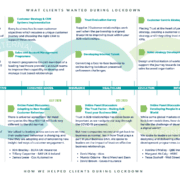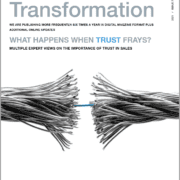The Trust Factor in B2B Client Relationship Management
Trust an oft-quoted word related to many elements of the B2B relationship. Significant bodies of research point to its importance, yet skirt around it. We think it’s a core pillar of how attuned an organisation is to its customer base. A key motivator / factor that plays a key role across all industries and sectors. It is often overlooked within the B2B environment as hard business processes and metrics tend to dominate.
Beaton (1994) stated that customer commitment was pivotal in any relationship, developing through three phases;
Commitment = courtship + bonding + forsaking others.
Within our research we looked for linkage between how attuned an organisation is to its customers and the level of bonding they generate. It is already clear that the common theme of trust emerges as central to the development of intimate attuned customers through the way they are managed.
However, much is spoken and little is known, precisely what is meant by ‘trust’ within a customer attuned context?
Definition
A Psychological state confirming the intention to accept vulnerability based upon positive expectations of the intentions or behaviour of another”. (Rousseau et al 1998)
A willingness to be vulnerable under conditions of risk and interdependence
Trust works on a number of levels and changes dependent upon how attuned you are. We will explore and develop these through further posts.
However, before we look into these we consider a number of conceptual equations that we believe lead to the development of trust within attuned customer relationships.
Memories, Credibility and Time
These bring in and link to other elements that are central to the effective attunement of your customer relationship namely; interdependence & equitability.
Trust in a way is an odd concept as it can make us feel good when our trust is confirmed and rewarded. However, it has the capacity to make us feel foolish and vulnerable when trust is abused and we lose out.
Trust works on a number of levels as our research has indicated. These enable us to develop an indication of your trust level and a trust strategy / plan within Customer Attuned.
We have bought together comparisons of trustworthiness and mechanics of trust to highlight where the key traits come together to develop, attune and enhance B2B customer relationships.
| The Grammars of Trust:- A model and General Implications and the customer value chain | ||||
| Form of Dependence | Shallow Dependence | Shallow Interdependence | Deep Dependence | Deep Interdependence |
| Risks | Indiscretion
Unreliability |
Poor coordination | Cheating
Abuse Neglect Self-esteem |
Misanticipation |
| Qualities of trustworthiness | Discretion
Reliability Competence |
Predictability
Consistency |
Integrity
Concern Benevolence |
Foresight
Intuition Empathy |
| Mechanisms of Trust | Deterrence | Discovery | Obligation | Internalisation |
| Relational Mechanisms | Fate Control | Contiguity | Network | Shared meaning, values, products, goals |
| Institutional Mechanisms | Historical records
Enforcement |
Communication and information systems | Quadratic control
Socialisation Selection |
Strategic Alignment
Common membership Discourse |
| Customer Value Chain | Awareness & Identity | Relationship | Community | Advocacy ~ Bonding |
| Type of trust |
Calculus based trust |
Knowledge based trust |
Identification based trust |
|
The above table highlights as the relationship (equitability & interdependence) increases then differing levels and types of trust evolve. This manifests itself in the development of increased customer attunement.
Therefore, if the relationship continues to attune itself with the customer, greater interdependence, equitability emerges and both sides trust each other “they become more attuned”.
We take it for granted that certain things will happen as that’s part of life’s/society’s, natural order of things; the car will take you from A to B, other driver’s will obey the traffic sign’s, etc. We place a level of trust that these things will happen, as the alternative is chaos. The same can be seen within your customer relationships, as customers will trust you and your products to deliver or do what you say. Here we start to explore the levels of trust that you can develop as you attune your organisation. Certain customers will operate at differing levels of trust dependent upon the equitability of the relationship, willingness to be interdependent, importance and potential.
However, all relationships start at the base level that we call “calculus base trust”, as illustrated in the table above, which we define as “Relationships based purely upon the organisations ability to deliver against basic expectations. As long as the costs of failure to them outweigh the benefits of fulfilment they will remain engaged”.
Based upon a calculation that an individual will achieve what they say they can do, as the costs of failure to them outweigh the benefits of completion and therefore acts as a deterrent.
Central to this view is control, where the individual’s actions are controlled via monitoring and the knowledge that the trustor will withdraw from future exchanges should their trust be violated.
- Leap of Faith by Dr Mark Hollyoake featured in the Journal of Sales Transformation - May 13, 2024
- Stop hiding behind your computer and get out to see your customers! - March 6, 2024
- B2B Trust Research: What are Boundary Spanners? - January 31, 2024


